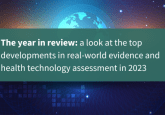Industry news round-up: updates from February 2023

In this latest instalment of our regular monthly column, we summarize a selection of key industry developments that have taken place over the past month.
February saw collaborations at the forefront of the news, with partnerships announced between Aetion and TREAT-NMD, Sysnav Healthcare and Roche, Veradigm® and HealthVerity® as well as Delve Health and the University of Washington, MedCan Support, Drug Science and Alta Flora, and COTA Inc and Clinical Research Data Sharing Alliance. Verana Health also expanded their research capabilities through the launch of a data module that applies AI and machine learning on registry data to provide high-quality real-word data to advance the care and treatment of people with non-muscle invasive bladder cancer. On the regulatory side, the FDA issue a new draft guidance on the use of externally controlled trials and NICE issued their first guidance under the early value assessment scheme. ISPOR were also in the news, announcing a new report on patient-preference studies in decision making.
From Industry
Delve Health and UW Medicine announce collaboration to generate AI-ready real-world databank for diabetes research through remote data capture
Delve Health and the University of Washington School of Medicine announce they are joining forces in the NIH-funded AI-READI project — Artificial Intelligence Ready Equitable Atlas for Diabetes Insight — to use remote capture of real-world data designed for AI analysis to advance research in Type 2 diabetes.
TREAT-NMD and Aetion to collaborate to progress real-world evidence research in rare neuromuscular disease
Aetion announced they are working with TREAT-NMD to collaborate on various initiatives aimed at accelerating the generation of RWE to support the neuromuscular disease community in the diagnosis, treatment and care of people with these often-devastating conditions. The three-year deal will see Aetion combine its deep regulatory-grade expertise in real-world evidence study design and analysis with the de-identified patient data collected by the TREAT-NMD Global Registry Network.
COTA becomes newest member of the Clinical Research Data Sharing Alliance to advance clinical trial and real-world data in oncology
COTA Inc announced they have been invited to form a strategic partnership with the Clinical Research Data Sharing Alliance (CRDSA) to explore new opportunities to advance the discovery of new treatments through clinical trials and RWD. COTA will join other CRDSA member organizations to participate in the Alliance’s steering committee and the Innovative Trial Design Working Group, who are focusing on non-small cell lung cancer. As well as researching ways to leverage RWD and clinical trial data in drug development, COTA will also help the alliance develop support and guidance to create best practices and guidelines for using these diverse data types in regulatory decision making and other uses.
Sysnav Healthcare and Roche unite to collect real-world data using movement tracking technology to improve outcomes for people with movement disorders
Sysnav Healthcare announced they are forming a multi-year partnership with Roche to use RWD collected via wearable, motion-capture biosensor technology to improve the outcomes for people with neuromuscular and other movement-associated disorders. Sysnav’s proprietary technology captures patients’ motor functions to help identify and track neurological and neuromuscular pathology patterns. Using the collected RWD, clinicians and researchers can interpret and analyze these neurological changes to develop new fit-for-purpose, regulatory-grade digital endpoints to measure outcomes for people with motor impairments as well as advance clinical research, drug development and newer technologies.
Veradigm to integrate cardiology and metabolic disease registry data with HealthVerity real-world data ecosystem to expand research and advance patient care
Veradigm® revealed they are partnering with HealthVerity® to connect their Cardiology and Metabolic Registries with HealthVerity’s IPGE Platform. This RWD ecosystem provides accurate patient matching and identity resolution technology that will allow researchers to access more complete and detailed longitudinal patient records, without the fragmentation that can occur with traditional patient tokenization approaches. By leveraging this technology, researchers can gain a more comprehensive understanding of the needs of people with cardiovascular disease and diabetes, enabling more effective decision making as well as advancing research into their care and treatment.
Verana Health announces release of Qdata non-muscle invasive bladder cancer real-world data module
Verana Health announced they are offering a urology Qdata® module aimed at supporting clinical research on non-muscle invasive bladder cancer (NMIBC). By collecting RWD derived from de-identified EHR data of 50,000 individuals with NMIBC in the American Urological Association’s Quality Registry, Qdata NMIBC can enable greater insights into the progression of the disease and how it can be most effectively treated.
New digital observational study underway in UK to generate real-world evidence for childhood epilepsy research
The pioneering UK study, a collaboration between MedCan Support, Drug Science and Alta Flora, will help researchers learn more about the role of medicinal cannabis in treating children with rare types of epilepsy. Researchers will analyze RWD submitted through a mobile app to learn about the symptoms, quality of life and health economic data from children with epilepsy taking prescription cannabis products. The goal of the study is to generate RWE to provide researchers with insights on the impact of these treatments and to guide the next generation of medicinal products.
ISPOR task force publishes new expert consensus guidance recommendations on patient-preference studies
The report, entitled “A Roadmap for Increasing the Usefulness and Impact of Patient-Preference Studies in Decision Making in Health: A Good Practices Report of an ISPOR Task Force” was published in the February 2023 issue of Value in Health and provides guidance to stakeholders for increasing the value and impact of patient-preference studies in decision making. Patient-preference studies are increasingly being utilized within drug development to bring the patient voice into the process and foster patient centricity and shared decision making within healthcare. The report builds on previous guidance documents from ISPOR on the topic and provides advice on the design, conduct, and dissemination of patient-preference studies in decision making.
From the Regulators
FDA issues latest RWD/RWE draft guidance on the use of externally controlled trials
The US Food and Drug Administration (FDA) issued a new draft guidance concerning the use of externally controlled trials in generating the evidence for new drugs and biological products to support regulatory decision-making. One of a series of guidance documents provided by the FDA under its Real-World Evidence (RWE) Program, the new document, entitled “Considerations for the Design and Conduct of Externally Controlled Trials for Drug and Biological Products”, provides the current thinking by the agency on the topic and is open for feedback before the final version of the guidance is completed.
NICE issues first guidance under early value assessment on digital mental health technologies for children and young people
National Institute for Health and Care Excellence (NICE) announced the first rapid health technology guidance recommending four self-help digital technologies for cognitive behavioural therapy to be used by children and young people with mild to moderate symptoms of anxiety or low mood. The independent NICE committee evaluated the initial data on these technologies to decide if they are suitable for early implementation in the NHS while more evidence is accumulated. They agreed these cognitive behavioural therapy technologies can be used by healthcare professionals as early-access treatment options for children and young people aged 5 to 18 years. Once they receive regulatory approval by the Digital Technology Assessment Criteria (DTAC) from NHS England, the technologies will be available for full use.






